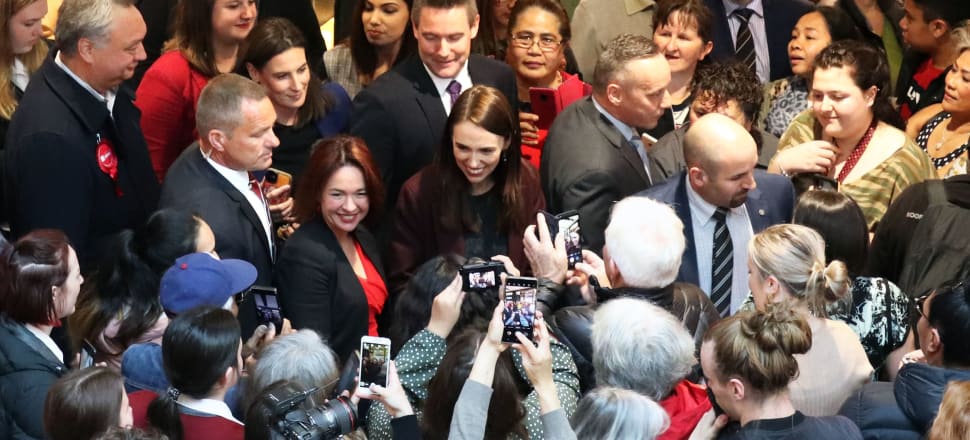
The risk of protesters and unwanted guests has spoiled the election campaign. Over back-to-back days in Auckland with the two Chrises, political editor Jo Moir observed increased security and vetting, and safe party-faithful crowds.
Analysis: At Auckland’s Viaduct on Friday afternoon Luxon bounced from one restaurant to another chatting with diners who had escaped the working week early by heading out for a boozy long lunch.
The managers of two of the three restaurants he visited knew the National Party leader was coming and with that came four diplomatic protection staff and a lot of forward planning.
The Luxon-friendly restaurant staff chatted, surrounded by cameras and microphones, about how business was going and how they’d got through workforce shortages.
It’s unclear whether any of the tables had been warned Luxon might be dropping by but certainly the dozen he bowled up to were pleased to see him.
He’d just come from reaffirming National’s 100-point economic plan at a hotel function room with party faithful, where Luxon spoke about the woeful state the economy is in, and the pinch of the cost of living crisis.
Neither of those things seemed an issue at the Viaduct where hundreds of people were indulging in a boozy afternoon lunch of seafood and steak, several bottles of wine deep, or in one case double-parked with espresso martinis and pints of lager.
Asked by Luxon what they were celebrating - one was a new business deal, another a 50th birthday party, and one group improvised and announced they were toasting to October 14 and the fact a change of government was coming.
READ MORE: * Electorates to watch: the battle for Northland * National dips in new poll, but no Labour bump * Peters writes his own history on backing Labour in 2017
While the Viaduct walkabout was an opportunity to get among voters, it was a safe and security-managed affair given the restaurants were stacked with Auckland businesspeople, who were frank with Luxon about their desire for a change of government. These weren't undecided or swing voters.
Chris Hipkins would have almost certainly encountered a very different reception, but also wouldn’t have gone in the first place for exactly that reason.
Luxon has charisma in those situations, he walks around waving to people like a celebrity, which in that setting he kind-of is. Diners were keen to meet the successful corporate chief executive who they are certain is about to lead the country.
He turns the charm on for a group of tipsy women, saying he’ll jump out of a birthday cake if it will mean they vote for him. His deputy, Nicola Willis, suggests that’s probably not needed.
The women are thrilled he’s come over after they cheered and beckoned him to come inside.
It was Willis who spotted them and told Luxon to head in and have a chat – Willis is exceptionally strategic in these situations and recognises a chance to have Luxon engaging with friendly women on the 6pm news.
She’s also mastered walking at pace in her high heels to keep up with Luxon, who likes to stride quickly.
Erica Stanford was less prepared for the mad dash and could be seen doing a little high-heel sprint at times to catch back up to her leader.
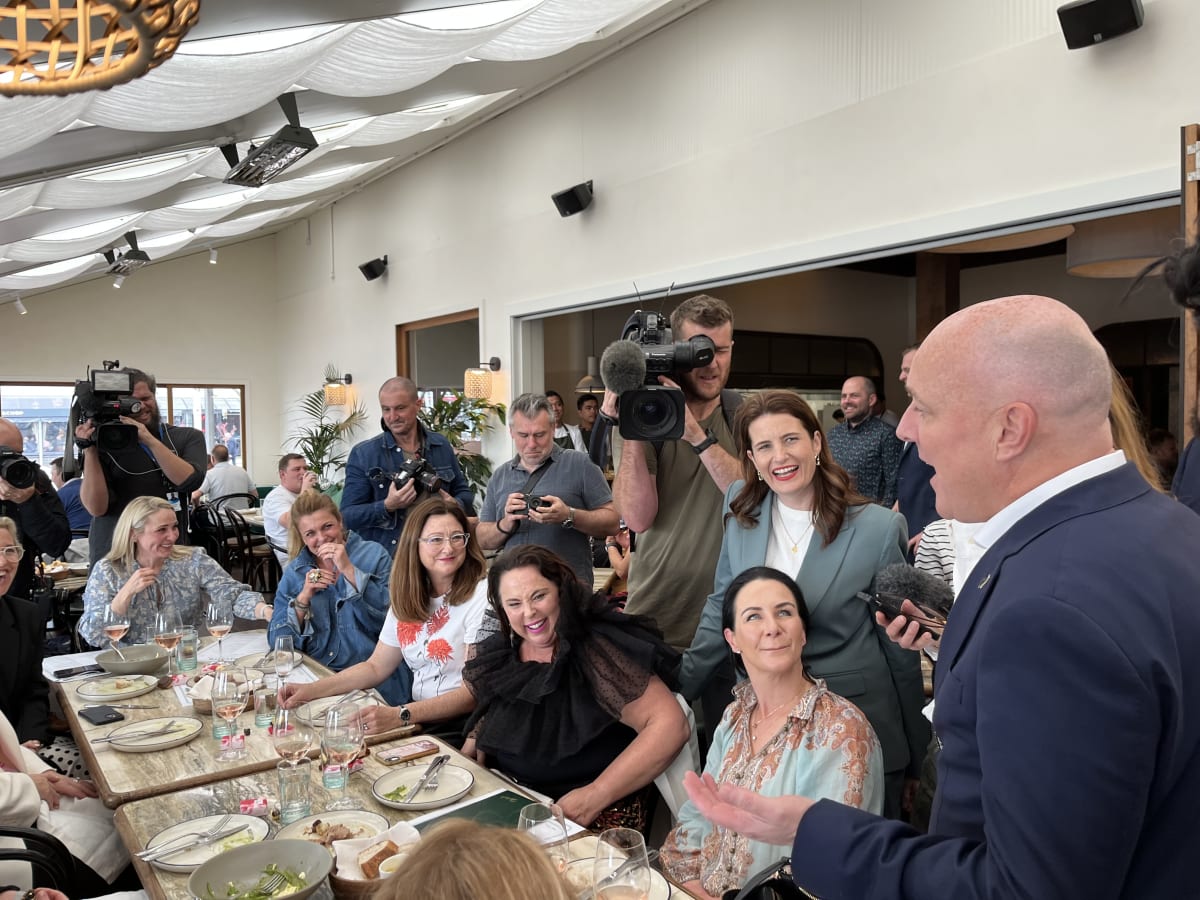
Another woman caught the attention of Newsroom and said she’d love to chat, so Luxon was pointed towards her.
She wasn’t sure who she was going to vote for, nobody had convinced her – the first person he’d met all day in that camp.
Luxon unloaded his prepared talking points on how he’d get the economy back on track. The diner was interested but finished by saying she was still undecided.
Everywhere Luxon went people called out a variety of well-wishes including, “we’re counting on you Chris to change the nation” and “don’t slip up”.
Luxon is personable in those situations - at times he friendly punched the arms of young guys he’d finished chatting to, or gently gripped the arm of middle-aged women as he left them to their lunch.
At one point he warned a group of men they need to get out and vote.
“It’s going to be closer than everyone thinks so get out and vote,” he tells them.
That comment is probably more about making sure National has a lot more votes than Act and New Zealand First than any real concern he has about Labour at this point.
The leaders of his two potential partners had finally agreed in a Newshub Powerbrokers’ debate the night before that they could work together in government.
Luxon would much prefer he didn’t require both out of fear it might turn into the coalition of chaos he’s been so busy accusing the three parties on the centre-left of.
It’s worried him enough to change his stock standard refusal to engage with questions about New Zealand First and a potential governing arrangement.
“Do not muck around. Do not be non-intentional with your party vote. MMP elections are notoriously always close and tight,” he warned.
On the other side of the political divide Labour leader Chris Hipkins flew into Auckland on Saturday and made his way to Onehunga for a long-awaited announcement for the Pasifika community.
After former leader and Prime Minister Jacinda Ardern delivered a formal apology in 2021 for the Dawn Raids the government has been working behind the scenes on a way to grant an amnesty for overstayers.
Where it landed was to grant one to anyone of any ethnicity who has been in New Zealand for more than 10 years, which is expected to capture anywhere between 14,000 and 20,000 people.
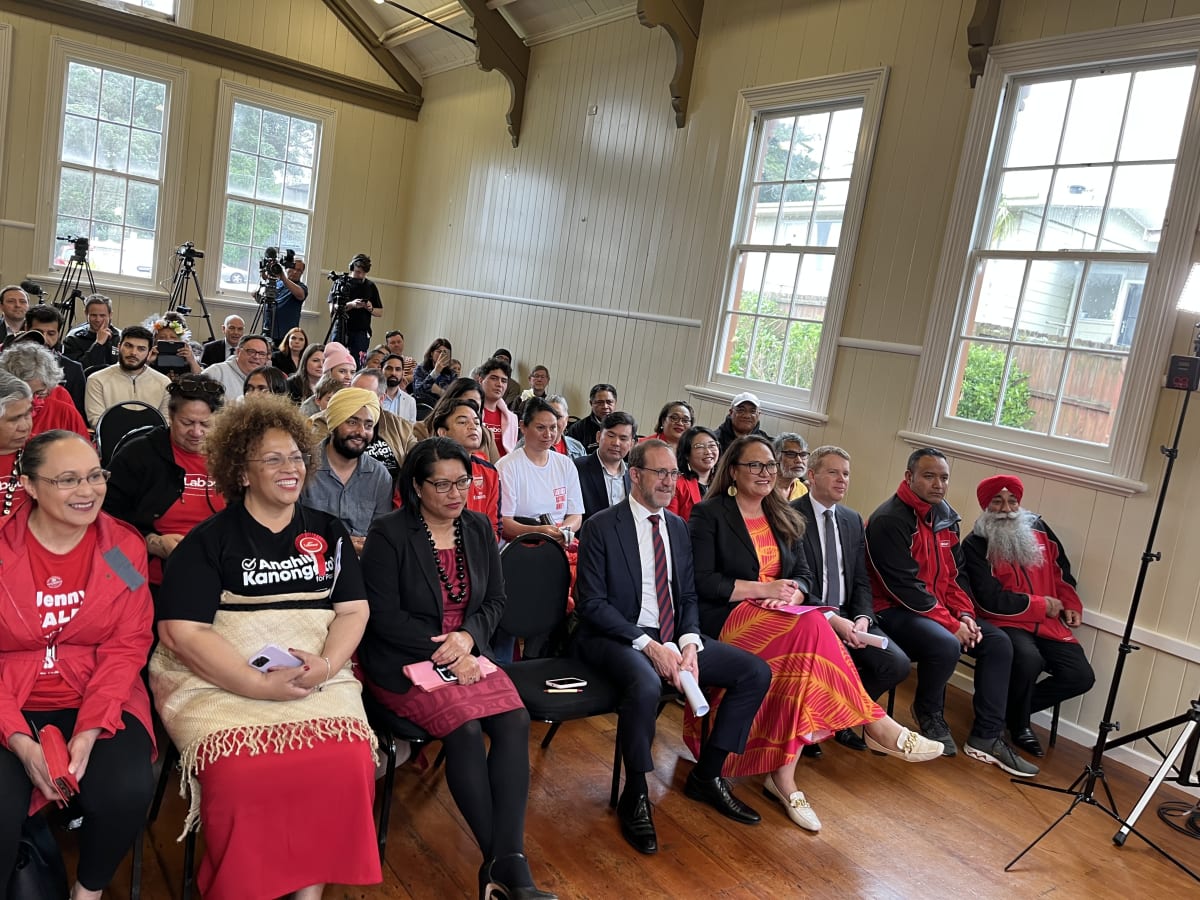
Hipkins also launched a new Labour policy to provide a reunification multi-entry visa for parents and grandparents of migrants living here to enter the country for up to 10 years.
On hearing it, National announced it, too, had the same policy, but under the name of a Boost visa rather than Super visa, as Labour is calling it.
Not one to miss out, Act then rushed out news of its Unite visa, but with a maximum stay of five years.
After a debate on Tuesday that showed more similarities than differences between the two Chrises, it’s not all that surprising another identical policy from both sides has been promised.
Saturday’s event was billed to be in front of about 60 guests representing various ethnicities but once again strict protocols around security and vetting meant those in the room were either MPs, candidates, staffers, volunteers, or media.
There was not only diplomatic protection security, but also a private security company.
There would have been a handful at most at the event who weren’t aware of what was to be announced.
But that didn’t make it any less emotional.
One young woman in the room, holding her two children on her lap, gasped before saying quite loudly, “holy shit”. She began crying and kissing her two boys over and over.
In the front row, the MP for Mana, Barbara Edmonds, wiped tears away from her face as Hipkins spoke of the impact the Dawn Raids had had on the Pasifika community and the security the amnesty would bring.
This is a policy quite different from National though, with Luxon rejecting the idea on Saturday and saying it would only “reward illegal immigration”.
Labour’s very deliberate and organised audience was no different to that of National’s on Friday when Luxon gathered a pre-approved, party-friendly group at the Pullman Hotel.
Both leaders and their campaign teams are conscious of the interruptions and protests that can so easily occur this year, in the post-Covid, divisive environment politics operates in.
Every opportunity for a non-friendly attendee has been removed by hand-picking who comes along and ticking off names as they enter events.
The rare exceptions on the campaign so far have been the Labour and Act campaign launches where Freedoms NZ supporters managed to get in through the ticketed system and the odd public walkabout where the protesters have got heads-up of the location.
It is why so few walkabouts are happening and when they do, they’re extremely prepared ahead of time and kept short.
The last thing leaders want are pictures on the 6pm news of them being yelled and jeered at, so instead the pictures are them engaging and hugging their volunteers and family members of their MPs and candidates.
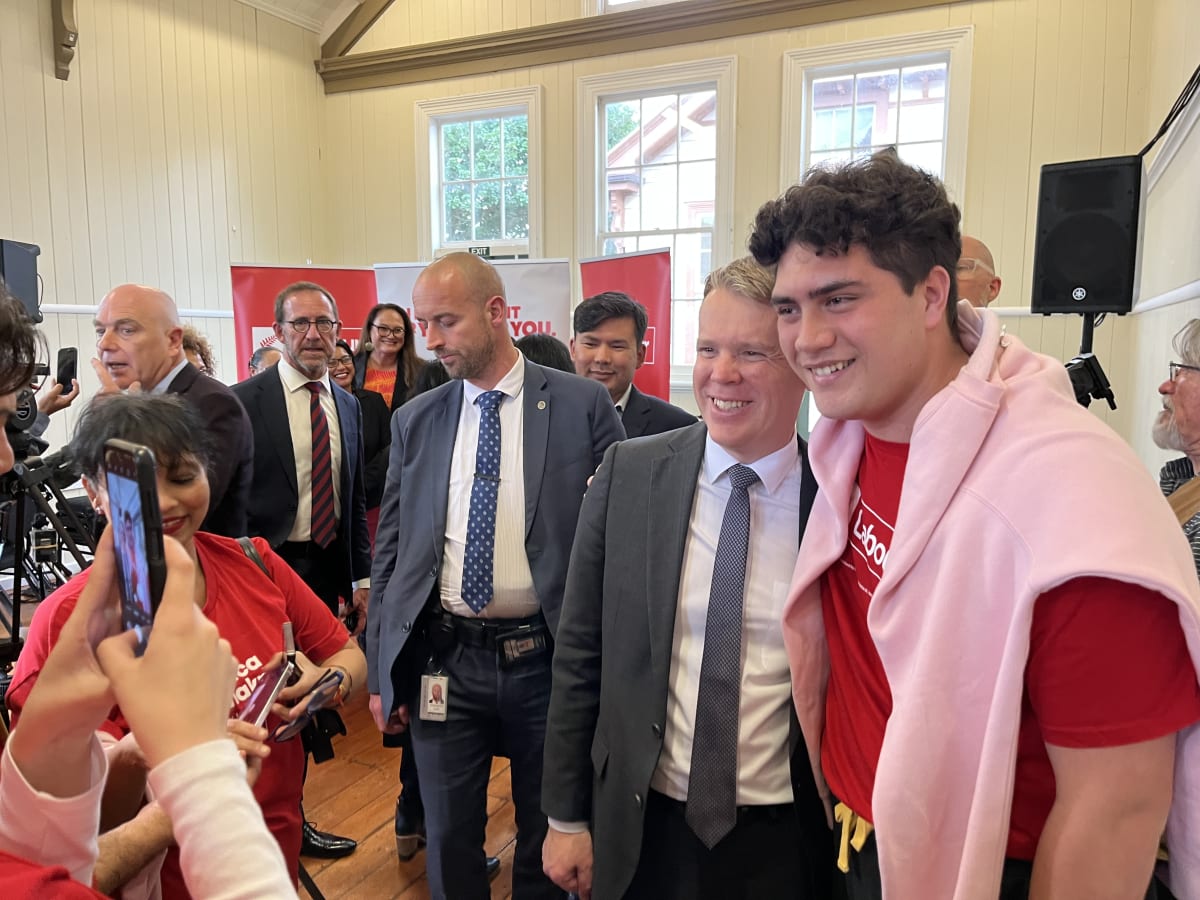
It’s not actually a campaign of getting out and talking to the undecided or swing voters in the flesh – those conversations are reserved for screens via social and mainstream media.
John Key, Bill English and Jacinda Ardern all ran campaigns that maximised time spent among random strangers, shaking as many hands of New Zealanders as they could in six weeks.
The strategy of their campaigns was the leader who shook and met the most Kiwis would likely win the election.
That theory has had to be parked this election and while Luxon and Hipkins both told Newsroom they had been out and about meeting potential voters in marginal seats, it’s not anywhere near enough to have any impact on which way the election might go.
Rather than a good first impression with a voter in person, they’re relying on that being done through a video, television screen, radio channel, or print.
Hipkins told Newsroom the campaign has had to change, despite his desire for it not to.
“We’re trying to run a campaign as normal as possible. Obviously, there’s a bit more noise around the edges of this campaign than there have been around previous ones, but I still feel like we’re able to get out there and meet a lot of people.
“There are some parts of the country where that’s a bigger challenge than other parts of the country. Clearly in Auckland and South Auckland in particular, there’s a small group of people associated with Brian Tamaki in particular who seem intent on disrupting the election campaign, but actually I don’t think that’s reflective of the overall mood of New Zealanders who do want to participate in the election campaign,” he said.
Likewise, Luxon said he didn’t always feel safe and in the past year had felt “unsafe” walking down Queen Street in the evening".
But he told Newsroom that hadn’t stopped him doing a huge number of public meetings for many months ahead of the campaign.
“I’ve been into many marginal seats, red seats, Labour seats, and why are we doing that? Because actually we have a huge opportunity to increase our party vote even in historical Labour strongholds,” he said.
Despite that, gone are the days of visits to the big shopping malls of the main cities. Town walkabouts are saved for places where there’s a friendly reception, and business owners are set-up for visits ahead of time.
It’s a combination of the political environment and two leaders whose personal polling to be Prime Minister is stuck in the low-20s.
Neither leader has the star power of Key, English, or Ardern, and can’t afford to go to a big open space and risk not being mobbed enough to make it look successful on a television screen.
That was never a problem or consideration for the former leaders – it happened everywhere they went in the elections from 2011 onwards.
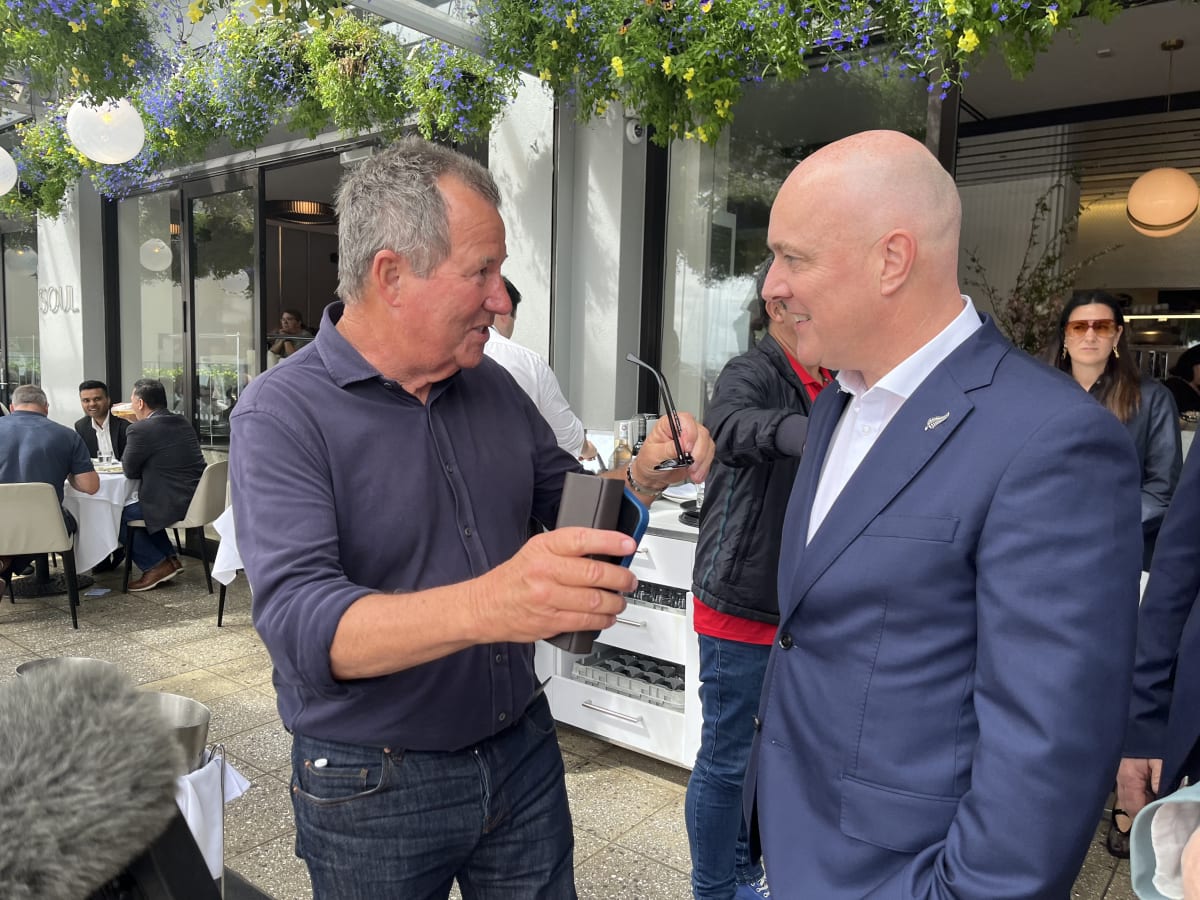
Public meetings talking direct to voters have taken place this year. Luxon did a big tour around the country over winter as did Act leader David Seymour, who is continuing to do so.
New Zealand First’s entire campaign is public meetings across the country because that is Winston Peters’ strength. He’s never been good at or enjoyed the individual business visits or street walkabouts, and town hall gatherings make it easy to talk to hundreds of people in one space.
The Green Party and Te Pāti Māori are continuing to run traditional grassroots-style campaigns at rallies, on the marae, via doorknocking and street corner meetings.
The campaigns have their challenges in more ways than one and take a toll.
Hipkins has at times looked sleep-deprived and stared blankly into space at events but then in Hawkes Bay last week he was also energised and found his rhythm making school lunches and meeting with those affected by the cyclone.
The hardest part of the campaign for him so far, he told Newsroom, was being in Auckland last Tuesday preparing for the first leaders’ debate instead of being home celebrating his daughter’s fifth birthday.
Luxon’s running a campaign that has him return home almost every evening, rather than stay overnight in the parts of the country he’s visiting.
It means a good sleep in his own bed but also cuts his days short in each town and city as he needs to allow time to get to the airport and catch the last flight of the day back to Auckland.
Luxon told Newsroom there was no particular reason he was doing that other than it was how he’d worked his schedule and it’s a “good base to execute from”.
Getting to decompress and talk through the day with his family each night seems to be working for him as he is bringing a lot of energy to the campaign and appears far more rested than any of the other leaders.
With three weeks to go and another leaders’ debate on Wednesday night there’s still plenty of campaigning to go.
For one of the Chrises it will end with the most sleep-depriving job of all – being Prime Minister.







